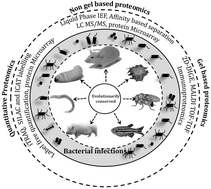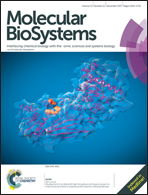Model system based proteomics to understand the host response during bacterial infections
Abstract
Infectious diseases caused by bacterial pathogens pose a major concern to public health and, thus, greater attention must be given to providing insightful knowledge on host–pathogen interactions. There are several theories addressing the dynamics of complex mechanisms of host–pathogen interactions. The availability of an ample number of universally accepted model systems, including vertebrates, invertebrates, and mammalian cells, provides in-depth transcriptomics data to evaluate these complex mechanisms during host–pathogen interactions. Recent model system based proteomic studies have addressed the issues related to human diseases by establishing the protein profile of model animals that closely resemble the environment. As a result, model system based proteomics has been widely accepted as a powerful and effective approach to understand the highly complex host–pathogen interfaces at their protein levels. This review offers a snapshot of the contributions of selective model systems on host–bacterial pathogen interactions through proteomic approaches.



 Please wait while we load your content...
Please wait while we load your content...